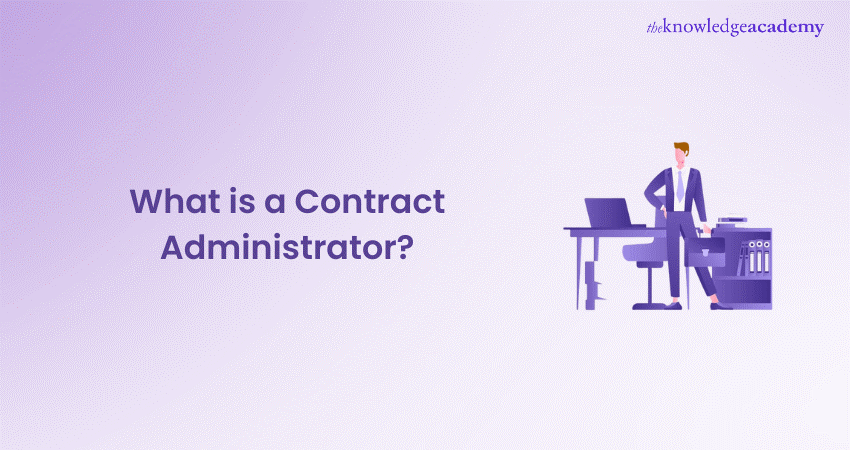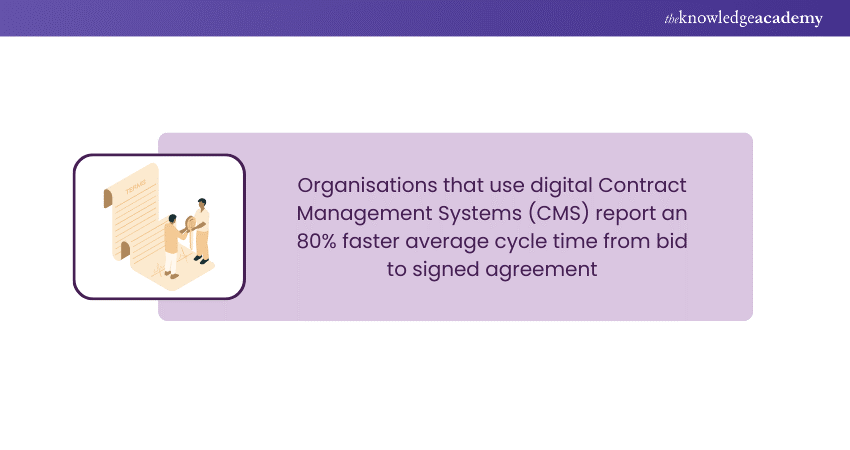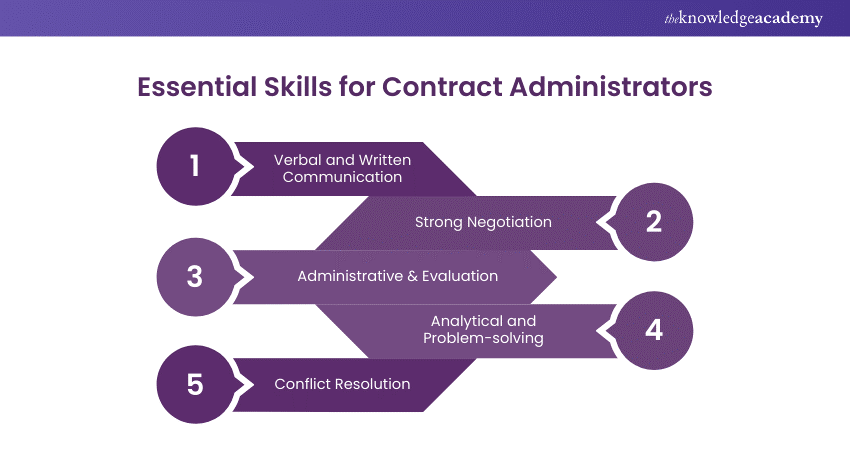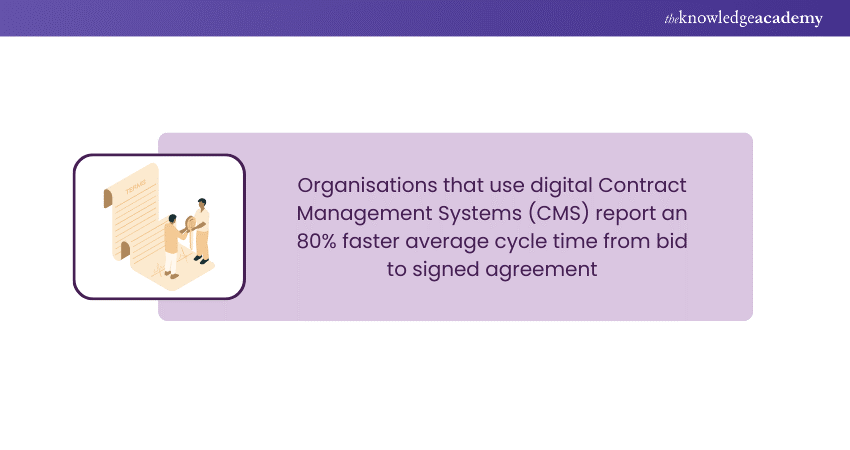We may not have the course you’re looking for. If you enquire or give us a call on +47 80010068 and speak to our training experts, we may still be able to help with your training requirements.
Training Outcomes Within Your Budget!
We ensure quality, budget-alignment, and timely delivery by our expert instructors.

Have you ever pondered on the functionality of contract agreements? How do the parties involved operate? Is it as complex as it sounds? If so, you have come to the right place! Contract administrators keep the corporate wheels turning by handling responsibilities such as negotiating terms, monitoring contract performance, and facilitating communication between parties.
If you are envisioning a future in this promising role, consider this blog as your guide! Read on and learn about the essential skills, responsibilities and qualifications needed to navigate and grow in this field.
Table of Contents
1) What is a Contract Administrator?
2) What Does a Contract Administrator Do?
3) Essential Skills for a Contract Administrator
4) Qualifications for a Contract Administrator
5) Contract Administrator Salary
6) Conclusion
What is a Contract Administrator?
A Contract Administrator is an individual responsible for preparing, negotiating, and reviewing contracts and completing numerous other administrative tasks. They approach contract drafting and negotiation to reduce risk, increase profits, and close deals quickly and efficiently
Contract administration is a broad discipline, and the general responsibilities of a Contract Administrator can include initiating, creating, editing, reviewing, and negotiating a contract to getting it signed with either wet ink or an electronic signature.
What Does a Contract Administrator Do?
A Contract Administrator does multiple tasks including drafting contracts, overseeing internal processes, and enforcing contracts. These tasks are detailed below:
1) Drafting Contracts
Each contract involves standardised and unique components. Contract Administrators are tasked with the following:
a) Drafting standard clauses in most companies' agreements and creating customised clauses that address unique business conditions.
b) Preparing the contract to ensure it meets each company's requirements and presenting it in straightforward language so that each party fully understands the document.
c) Ensuring that all agreements comply with relevant industry standards and regulations.
After a Contract Administrator presents the document to each party, they may adjust depending on changes in a company's budget or other limitations that might affect the agreement's scope.
Want to learn about the legal aspects of constructing a business contract? Register for our comprehensive Business Contract Law Course now!
2) Overseeing Internal Processes
Companies often require different employees to contribute to, review and approve contracts. Contract Administrators facilitate these review processes, acting as a central point of contact who can address employees' concerns.
If a contract is legally sensitive, Contract Administrators consult legal teams to manage risks and limit liabilities. They communicate updates to every internal stakeholder as the contract progresses toward its final version.

3) Serving as a Liaison
Contract negotiations with an outside party, such as another vendor, require a liaison on each side. Contract Administrators fulfil that role by representing their companies, communicating priorities, and listening to the other party's perspective.
They report unresolved issues to executives who can agree to updated terms. As liaisons, Contract Administrators pose and answer questions about clauses and learn about the factors that affect prices or conditions an external party presents during negotiations.
4) Monitoring and Enforcing Contracts
Once the relevant parties sign an agreement, Contract Administrators monitor projects to ensure the other parties are meeting all agreed-upon terms and conditions. If they identify a concern, they resolve it with the relevant party.
In case a dispute arises, Contract Administrators help their company's leadership navigate it, answering questions about the contract's guarantees and how to settle the disagreement. Complying with contracts help businesses adhere to budgets and prevent risks.
Gain in-depth knowledge about commercial business contracts with our Commercial Contracts Management Training – Sign up now!
Essential Skills for a Contract Administrator
A Contract Administrator must possess a diverse set of skills ranging from basic communication skills to dynamic Project Management skills. Let’s explore each of them

1) Strong Communication
Effective communication skills are essential for Contract Administrators as they communicate the interests and demands of contract stakeholders across the organisation. They’re responsible for securing the most favourable terms for their business through contract negotiations, which naturally demand strong communication abilities.
2) Effective Negotiation
Contract Administrators need to show more advanced negotiation skills than just being good communicators. They must be assertive, creative, and knowledgeable about the law and its caveats. They also need adequate collaboration and time management skills since these result in better outcomes when drafting contracts and agreeing upon terms.
3) Analytical Thinking
Successful Contract Administrators are highly detail-oriented so that they can minimise contract errors and reduce risk as much as possible within a contract. They need the ability to identify contentious contract clauses and examine loopholes to protect the business from taking on too much risk with a new contract.
4) Project Management
The best Contract Administrators will also have a strong background in Project Management. This is advantageous as this role encompasses numerous time-sensitive responsibilities. They often need to consult with multiple teams and are responsible for the bulk of contract lifecycle management, meaning they must allocate time and resources wisely.
Qualifications for a Contract Administrator
Now that we've considered the skills and responsibilities associated with Contract administration, let's explore some of the qualifications employers consider when hiring a Contract Administrator
1) Education Requirements
Most employers need Contract Administrator candidates to have at least a bachelor's degree in a business-related field, such as business administration or Human Resource management. Candidates with a master's degree in business administration can have improved chances of securing opportunities since they offer expertise informed by additional years of education.
Some organisations might need a Contract Administrator experienced in law to help them navigate legally sensitive dealings.
2) Relevant Experience
Before becoming Contract Administrators, professionals on this career path typically work in entry-level administration positions. These positions help them learn about the business and negotiation practices that support their employer's business model.
They need to learn how the contracts' contents affect the rest of a business's operations before they're responsible for finalising key details that determine a company's success. Employers may seek candidates with extensive experience in a particular industry if the company's contracts typically contain specialised concepts.
3) Professional Training
Contract Administrators can pursue additional training through certification. These credentials require a different combination of college, work experience and continuing education hours. The following certifications are prioritised:
a) Contract Negotiation: This certification encompasses all the fundamental concepts associated with contract negotiation.
b) Commercial Contracts Management: This certification familiarises candidates with service-level agreements to serve a company's internal operations.
c) Managing Contractors: This certification helps candidates acquire skills for efficient contractor collaboration and supervision. They can also gain deeper insight on the legal and compliance requirements in Contractor Management.
d) Contract Management Certification: This certification helps candidates hone contract creation skills and stay updated on current industry standards and practices. It enhances job prospects in the field of procurement and Project Management.
Contract Administrator Salary
This table breaks down the average annual salary for Contract Administrators across three major regions – the UK, USA and India:

Source: Glassdoor
Conclusion
In conclusion, a Contract Administrator plays a vital role in managing agreements and ensuring industry compliance. With a combination of negotiation skills, analytical mindset, strong communication skills and Project Management expertise, these professionals form the backbone of Contract Management. As organisations and industries continue to evolve, the demand for skilled Contract Administrators will only grow, providing exciting career opportunities.
Familiarise yourself with the fundamentals of contract negotiation with our up-to-date Contract Negotiation Course – Register now!
Frequently Asked Questions

Businesses employ Contract Administrators when their business model involves working with multiple vendors and other businesses. They track and update business agreements, helping organisations prevent conflicts and fulfil obligations.

The four key aspects of Contract Administration are:
a) Contract Formation and Negotiation
b) Contract Execution and Implementation
c) Performance Monitoring and Management
d) Contract Closure and Termination

The Knowledge Academy takes global learning to new heights, offering over 30,000 online courses across 490+ locations in 220 countries. This expansive reach ensures accessibility and convenience for learners worldwide.
Alongside our diverse Online Course Catalogue, encompassing 19 major categories, we go the extra mile by providing a plethora of free educational Online Resources like News updates, Blogs, videos, webinars, and interview questions. Tailoring learning experiences further, professionals can maximise value with customisable Course Bundles of TKA.

The Knowledge Academy’s Knowledge Pass, a prepaid voucher, adds another layer of flexibility, allowing course bookings over a 12-month period. Join us on a journey where education knows no bounds.

The Knowledge Academy offers various CIPS Courses, including the CIPS Level 2 Certificate in Procurement and Supply Operations Course and the CIPS Level 3 Advanced Certificate in Procurement and Supply Operations Course. These courses cater to different skill levels, providing comprehensive insights into Accounting Principles.
Our Accounting and Finance Blogs cover a range of topics related to Contract Management and administration, offering valuable resources, best practices, and industry insights. Whether you are a beginner or looking to advance your Project Contract Management skills, The Knowledge Academy's diverse courses and informative blogs have got you covered.
Upcoming Accounting and Finance Resources Batches & Dates
Date
 CIPS Level 3 Advanced Certificate in Procurement and Supply Operations Course
CIPS Level 3 Advanced Certificate in Procurement and Supply Operations Course







 Top Rated Course
Top Rated Course



 If you wish to make any changes to your course, please
If you wish to make any changes to your course, please


